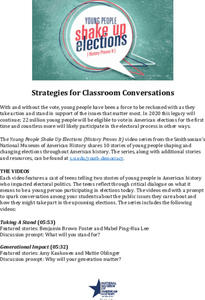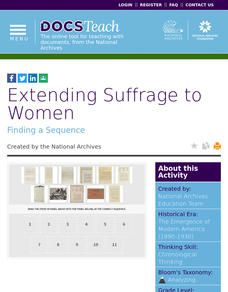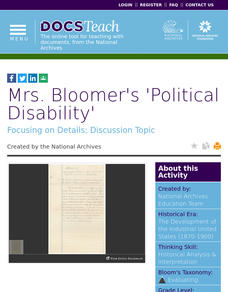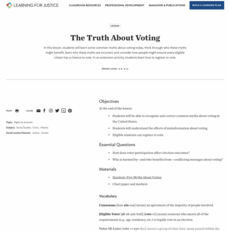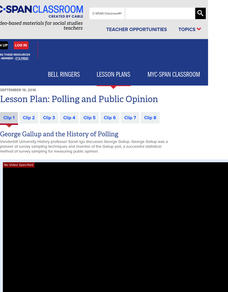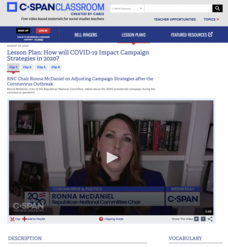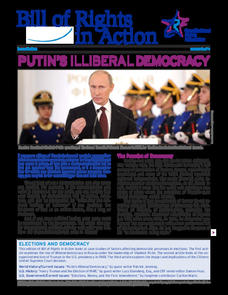DocsTeach
Analyzing a Letter About American Indian Voting Rights
An informative activity focuses on the law preventing Native Americans from voting until 1947. Scholars read documents from the Office of Indian Affairs, complete an online worksheet, and participate in group discussion. Academics learn...
DocsTeach
Suffrage Photograph Analysis
Votes for women! Young scholars use images to explore the suffrage movement and its impact on the United States. Historians work in groups or pairs to interpret the photograph, complete a worksheet, and discuss how their opinions of the...
Center for History Education
Helping to Move On? An Analysis of the Reconstruction Amendments
Reconstruction amendments: a helping hand or another form of slavery? An inquisitive lesson compares the Reconstruction legislation that ended slavery, granted citizenship, and protected voting right for African American men. Scholars...
Center for History Education
Democratic Ideas of the 1776 Maryland Constitution
1776 was a year of political upheaval in the American colonies. Academics examine the Maryland Constitution to understand the desire to break with Great Britain. Young historians learn about Maryland's efforts to extend rights to its...
Smithsonian Institution
Young People Shake Up Elections (History Proves It) Educator Guide
Vote, it's your civic duty! The resource provides several videos about voting in the United States. Scholars watch a series of topics ranging from youth participation to civic action. The educator's guide provides teachers with...
DocsTeach
Extending Suffrage to Women
Votes for women! The activity highlights the push for the Nineteenth Amendment giving women the right to vote. High school scholars learn how the Fifteenth Amendment giving African American men the right to vote helped to spark the...
DocsTeach
Mrs. Bloomer's 'Political Disability'
It's hard to believe that women had to argue for the right to vote a mere 100 years ago. Today, young historians can examine their case left behind in primary sources. Using a letter from a woman who claimed she should be able to vote...
Teaching Tolerance
The True History of Voting Rights
Explore what voting rights really are in an intriguing activity that explores the history of American voting. The resource examines the timeline of voting rights in the United States with group discussions, hands-on-activities, and...
Teaching Tolerance
The Truth About Voting
True or False: Only Presidential elections matter. Academics delve into common voting myths to understand what is true and why the election process is critical to democracy. The lesson uses group discussion, activities, and handouts to...
National Endowment for the Humanities
The Omnipotence of the Majority
While the American system is based on the idea of almost-universal suffrage for adults, great thinkers have had concerns about this system of governance. Using classic writings from Alexis de Tocqueville and videos highlighting thinkers...
Teaching Tolerance
Why Local Elections Matter
Uncle Sam wants everyone to vote in local elections! Geared toward middle and high school scholars, the resource explores voter turnout and the importance of local elections. Academics participate in group discussion, complete...
C-SPAN
Survey Analysis- Public Perceptions of Voting and Elections
The perception of fairness in elections becomes more important with each passing election. Using data from a C-SPAN poll, budding historians consider the differences between how people perceive elections. The resource includes videos of...
College Board
Civic Knowledge and Action in AP U.S. Government and Politics
Vote, it's your civic duty! The high school lesson focuses on voter turnout and civic participation with a series of activities. Young scholars analyze data to discover voter turnout trends, complete worksheets, and participate in group...
Facing History and Ourselves
The Audacity of a Vote: Susan B. Anthony’s Arrest
Susan B. Anthony's speech "Is It a Crime for Women to Vote?" takes center stage in a lesson that asks class members to consider how they might respond to what they consider an unjust law. Groups work through the speech paragraph by...
C-SPAN
Polling and Public Opinion
Polls are ubiquitous in American politics, but just how reliable and equal are they? A video-driven resource helps learners discuss the question by examining what pollsters and pundits say. Extension activities involve evaluating the...
C-SPAN
How will COVID-19 Impact Campaign Strategies in 2020?
While COVID-19 has changed almost everything about daily life, it's also had a tremendous impact on the 2020 presidential contest. Using video clips featuring political advisors from both sides of the aisle, learners brainstorm what they...
C-SPAN
Should Your State Modify Its Voter Registration Laws and Methods for Submitting a Ballot?
What is the balance between democracy and security? Using articles and videos that examine state voting procedures, learners explore the difficult question. After looking at voting regulations in their state and nationally, they consider...
C-SPAN
Should States Shift to Mail-In Voting during the Coronavirus Pandemic?
With the coronavirus pausing many norms in American society, officials are trying to decide how to safely hold voting in the 2020 presidential election. Using curated video clips, including speeches from Congress, journalists, and...
iCivics
Students Power Elections
A Students Power Elections resource guide provides would-be voters with the guidance they need to become voters. Included in the packet is information about voter registration and voting, how to research candidates and ballot measures,...
Encyclopedia Britannica
Get out the Vote Campaign
While some of your young scholars may be too young to vote, they can get involved in the election process by creating a nonpartisan campaign encouraging voter registration. After researching how to register to vote, class members design...
Encyclopedia Britannica
Beyond a Two-Party System
Young political scientists go beyond the two-party system and research third-party candidates running in the 2020 US Presidential election. Groups present background information about the candidate, the party's platform points, and a...
C-SPAN
What Are Ways for Youth to Engage in Politics?
Help young people become excited to participate in politics. High school historians participate in an engaging lesson focused on ways for youth to become involved in government. Scholars review articles, videos, and essential vocabulary...
Constitutional Rights Foundation
The Troubled Elections of 1796 and 1800
Congress does more than create new laws. Political scientists delve into the elections of 1796 and 1800 to understand how political parties, the Electoral College, and personal agendas affected the election process. The resource also...
Constitutional Rights Foundation
Putin's Illiberal Democracy
Is Russia really a democracy? High school scholars explore Russian democracy under the leadership of President Putin. The resource provides opportunity for group discussion, writing, and research to understand Russia's political history,...






